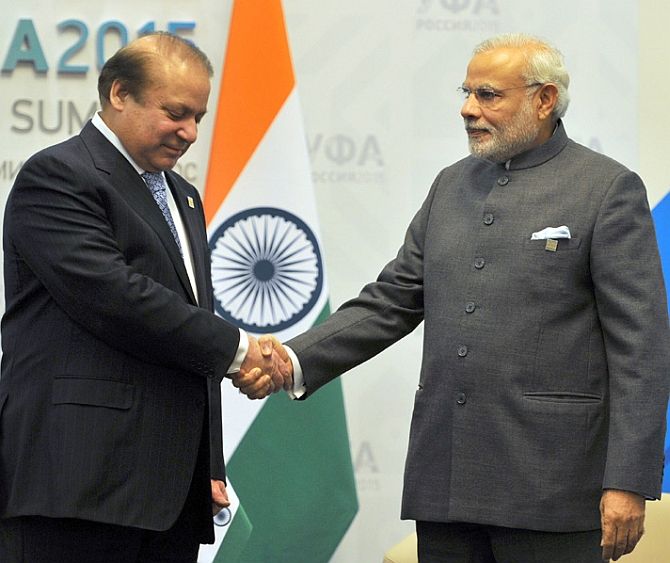
Pakistan has demanded more evidence in the 26/11 case
In a turnaround, Pakistan asked for "more evidence and information" from India on the Mumbai attack case and asserted that talks cannot take place without Kashmir being on the agenda, barely three days after the two countries agreed to re-engage.
Going back to its oft-repeated stand, Pakistan Prime Minister's Adviser on National Security and Foreign Affairs Sartaj Aziz made it clear "no dialogue will take place with India unless Kashmir issue is included in the agenda."
Aziz, who was present in the meeting between Prime Minister Nawaz Sharif and his Indian counterpart Narendra Modi in Ufa, Russia last week, came out with a two-page statement before reporters in Islamabad and took a few questions.
While a joint statement issued after the Sharif-Modi talks said the two sides will find ways and means to expedite the Mumbai trial, Aziz indicated that it will take some time, putting the onus on India. "We need more information and evidence to conclude the (Mumbai) trial. The reference to 'additional information' (in the Ufa statement) is a recognition of the need that more information is needed to expedite the trial," he said.
India has been upset over the almost non-existent trial in the 2008 Mumbai attack case, with even the mastermind Zaki-ur Rahman Lakhvi being released by the court as the Pakistan government failed to furnish the required evidence before the anti-terrorism court.
New Delhi has maintained that it has supplied sufficient information and evidence to nail the accused in the 2008 attack in Mumbai that left 166 people dead.
In remarks seen as assuaging domestic concerns after Sharif came under sharp attack over omission of Kashmir in the joint statement, Aziz said the Pakistan prime minister "affirmed our principled position in clear and unequivocal terms during his annual speech at the United Nations General Assembly. We would continue to extend political, moral, and diplomatic support to our Kashmiri brethren."
Aziz also made it a point to rake up the Samjhauta blast and Balochistan issues over which India has made strong rebuttals.
Sharif "sought information on the progress made on the trial of Samjhauta express terrorist incident," he said. While stating that Sharif and Modi had a "frank" discussion on each other's concerns, Aziz said, "Pakistan has been deeply concerned, not only about hostile statements from Indian ministers but also about Indian interference in Pakistan, including continuing support for insurgency in Balochistan."
He said to address these "acrimonious concerns" the two sides agreed that their national security advisers would meet, first in New Delhi and then in Islamabad.
Aziz said the joint statement clearly recognises that "India and Pakistan have a collective responsibility to ensure peace and promote development. To do so, they are prepared to discuss all outstanding issues".
"And we all know which are those outstanding issues. Kashmir of course tops the list of outstanding issues, but there are also other important issues like Siachen, Sir Creek, interference and water," he said.
He said Pakistan stays firms on its principled stance on the issue with dignity and honour and "no compromise" will be made on it.
Aziz said India has been repeating its traditional accusations of cross border terrorism while overlooking the decisive counter-terrorism campaign launched by Pakistan in the past two years.
Noting that all the issues will now be followed up through different channels, he said Sharif-Modi "meeting served to achieve one major objective, i.e. reduce tensions and create environment for meaningful talks on all issues of importance to both countries."
The adviser said the Ufa meeting was not the formal start of any dialogue process but it served an important purpose to achieve an understanding that both neighbours must reduce tensions and hostility in order to constructively engage in a structured dialogue on all issues of bilateral and regional interest, including the core issue of Jammu and Kashmir.
The meeting provided an opportunity to identify some areas where the two countries could promote cooperation right away in order to reduce tensions and hostility, he said, adding that peace and tranquillity on the Line of Control and working boundary is in the interest of both countries.
He said even though at present ceasefire is by and large being maintained, there have been occasions when this ceasefire was violated causing casualties and injuries to people inhabiting those areas.
Aziz said both leaders agreed that the existing mechanism of regular meetings between director general Rangers, DG Border Security Force and DG MOs should be held to ensure full compliance with the 2003 Ceasefire Understanding. He said the two sides have also agreed to revive Track II dialogue to explore ways of resolving issues that are lingering for a long time and need to be resolved in order to give peace a chance.
Modalities for this track will be worked out through diplomatic channels, he added.
The adviser also said that Prime Minister Modi shared the over-arching vision of Pakistan Prime Minister that peaceful and good neighbourly relations are imperative to create the necessary space in which both countries should focus on the economic welfare of their peoples.
The two prime ministers agreed that cooperation in promoting religious tourism will help ameliorate the difficulties faced by visitors, Aziz said. He said that the agreement on the early release of fishermen is a humanitarian gesture.
Aziz said Prime Minister Sharif's desire of peaceful neighbourhood is the centre-piece of his foreign policy vision because this would best promote "our national interests" and also create the conditions wherein the government can focus its resources on the socio-economic uplift of our people. Modi and Sharif, in their first bilateral talks in over a year, met for nearly one hour on the sidelines of the Shanghai Cooperation Organisation Summit in Ufa, Russia last week.
Image: Prime Minister Narendra Modi and his Pakistani counterpart Nawaz Sharif during their recent visit to Russia had decided to revive dialogue and find ways to expedite the trial of the Mumbai attacks









